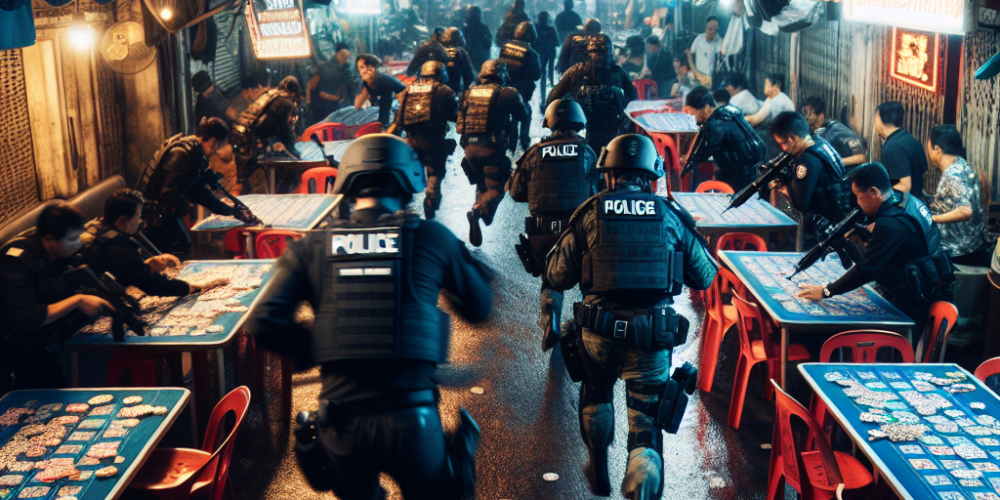In a significant law enforcement action, Bangkok authorities conducted a major raid in the Don Muang district, capturing over 200 individuals involved in one of the city’s most profitable illegal gambling dens. The operation, known as “Taming the Lion,” successfully dismantled this high-stakes operation that generated monthly revenues exceeding THB 500 million, equivalent to $13.8 million.
The gambling house, which operated nearly 24/7, opened at 10 a.m. and continued until 6 a.m. the following day, ensuring only a brief pause for closure. This non-stop operation was a significant factor in its substantial earnings. For weeks, the Ministry of Interior’s Special Operations Unit had been monitoring the venue, acting on valuable tips from local residents disturbed by the noise and unusual activities during late hours. These insights were instrumental, as Acting Prime Minister Phumtham Wechayachai noted, praising the public’s role in providing a “crucial lead.”
During the covert investigation, police uncovered a sophisticated setup designed to evade law enforcement. Previous crackdowns had resulted in minor penalties, failing to deter the operation. The venue consisted of five distinct gambling rooms, including a central hall and exclusive VIP sections. Each of these rooms was capable of generating up to THB 4 million ($123,700) in just a few hours, indicating the vast scale of the operation.
Authorities confiscated numerous gambling tables, betting equipment, and 17 bank passbooks. These passbooks were crucial for tracing the financial transactions that fueled this illegal enterprise, helping to identify those orchestrating the larger network.
The raid on the Don Muang den is part of a broader strategy to tackle illegal gambling across Bangkok. Officials believe this operation was linked to a more extensive network of illicit gambling establishments throughout the city. By targeting this site, they aim to gather intelligence on the overarching organization, hoping to ultimately dismantle the entire network. “This den was only a part of a larger picture,” remarked Wechayachai, emphasizing the persistent nature of these illegal activities.
Legal proceedings are underway for those arrested, as authorities continue their efforts to curb illegal gambling. Earlier this year, a tip-off led to the discovery of another illegal casino in a warehouse in the Bang Yai district of Nonthaburi. In 2023, a significant raid by the Thai Cyber Crime Investigation Bureau on UFAV8, an online gambling hub, unveiled a multi-million baht gambling network, highlighting the pervasive nature of these operations.
The success of the Don Muang raid was officially announced on August 27 at 11 p.m., with a press conference led by Wechayachai and attended by senior figures from the Ministry of Interior and the Royal Thai Police. Prominent officials present included the Ministry of Interior’s permanent secretary, Ansit Samphantharat, and the Department of Provincial Administration’s deputy director-general, Ronnarong Thipsiri.
Despite these efforts, the battle against illegal gambling is far from over. The lucrative nature of such operations ensures they remain a recurring challenge for law enforcement. While some argue that harsher penalties and stricter regulations are necessary to dissuade these activities, others believe that addressing the demand for gambling through legal means could be a more effective solution. Legalization and regulation, they argue, could redirect funds to the state and reduce the appeal of underground establishments.
The broader economic context is also worth considering. In many regions, illegal gambling flourishes due to economic inequalities and limited opportunities, providing people with a seemingly lucrative alternative. While authorities continue to dismantle these networks, addressing the root causes of such activities remains critical. By understanding and mitigating the factors that drive individuals toward illegal gambling, more sustainable solutions might be found.
In conclusion, Operation “Taming the Lion” marks a significant step in the ongoing fight against illegal gambling in Bangkok. However, the complexity and resilience of these networks require continued vigilance and innovative approaches. As law enforcement and policymakers evaluate their strategies, the discussion around regulation, economic factors, and public engagement remains at the forefront.

David Harrison stands tall in gambling journalism, marrying his firsthand casino experiences with a deep understanding of betting psychology. His articles transform complex gambling jargon into engaging tales of strategy and chance, making the world of betting accessible and enjoyable. David’s knack for narrative extends beyond print, making him a sought-after speaker on gambling trends and future bets. In the realm of gambling, David is both a scholar and a storyteller, captivating readers and listeners alike.
















